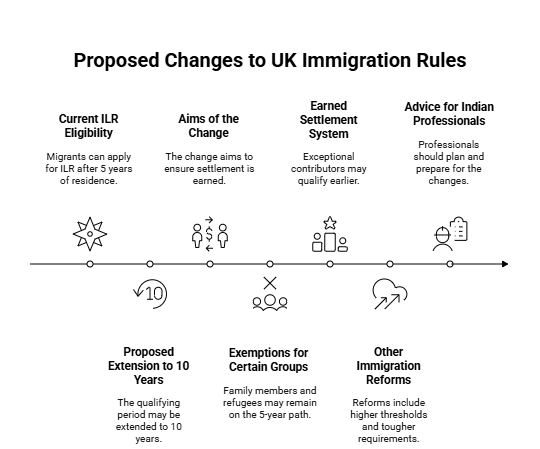Posted on October 06 2025
UK Proposes Extending ILR Qualifying Period to 10 Years. Check If You’re Affected!
By , Editor
Updated October 06 2025
Highlights: UK Plans 10-Year ILR Rule under New Immigration Reforms
- The UK government has proposed doubling the ILR qualifying period from 5 to 10 years for most visa holders under the 2025 Immigration White Paper.
- The plan introduces an “earned settlement” system, allowing faster ILR eligibility for migrants who make strong economic or social contributions.
- Family and humanitarian visa routes may continue to follow the existing 5-year settlement period.
- The proposal is not yet law, it remains under consultation and parliamentary review before final approval.
- The move is part of the UK’s broader strategy to reduce net migration and tighten settlement pathways by 2026.
*Want to apply for UK ILR? Get in touch with experts at Y-Axis to guide you with the process.
Planning to Settle in the UK? Here’s How the Proposed ILR Change Affects You
Under current UK immigration rules, most migrants — including those on the Skilled Worker Visa — can apply for Indefinite Leave to Remain (ILR) after completing five years of continuous residence. However, under the government’s 2025 Immigration White Paper, this qualifying period could be extended to ten years for most visa categories. The plan is still a proposal, meaning it hasn’t been implemented yet, but it signals a major shift in how permanent settlement in the UK may work in the near future.
If approved, this would mean migrants would need to spend twice as long in the UK before becoming eligible for ILR. The change aims to ensure that settlement is “earned” — rewarding those who show long-term economic participation, strong English skills, tax compliance, and community contribution.
That said, not everyone will be affected equally. Family members of British citizens, refugees, and those on humanitarian visas are likely to remain on the existing five-year pathway. The government has also hinted at an “earned settlement” system, where exceptional contributors could still qualify earlier than ten years, though exact details will only be known after public consultation.

At the same time, the UK is rolling out several other immigration reforms, including:
- Higher salary and skill thresholds for Skilled Worker applicants.
- Closure of the overseas recruitment route for social care roles.
- Tougher English language requirements for dependants and family members.
- Increased sponsor accountability and digital case processing to reduce fraud and delays.
For Indian professionals planning to settle in the UK, this proposal highlights the need for longer-term planning and early preparation. Those already living and working in the UK on Skilled Worker or Graduate visas should track policy updates closely and, where possible, apply for ILR under the current rules before the new system comes into effect.
*Want to migrate to the UK? Sign up with Y-Axis for end-to-end assistance with the process.
What Migrants Should Do before the UK’s ILR Changes Take Effect
The proposed 10-year ILR rule signals one of the most significant settlement reforms in recent years. While it is not yet implemented, it reflects the UK government’s intention to make permanent residency an achievement earned through long-term contribution and integration.
For now, migrants who are already on a five-year route to ILR can continue under existing rules until any official changes take effect. Those planning to apply in the near future should stay informed, track consultations, and submit their ILR applications early where possible. Early preparation can help ensure eligibility under current criteria before new regulations are enforced.
If you are an Indian professional working in the UK, this proposal could influence your long-term plans, from job stability to family settlement. It is important to:
- Keep your visa and sponsorship active without any gaps in residence.
- Strengthen your profile through consistent employment, tax compliance, and English language skills.
- Monitor official updates from the UK Home Office and GOV.UK announcements.
- Seek professional guidance to assess how the proposal could impact your personal ILR timeline.
Y-Axis experts can help you evaluate your eligibility, plan your ILR route, and prepare a strong application before new settlement rules come into force.
*Are you looking for step-by-step assistance with UK immigration? Contact Y-Axis, the world’s No.1 overseas immigration consultancy!
For recent immigration updates on the UK, check out Y-Axis UK immigration News!
FAQs
1. What is the UK’s 10-year ILR proposal?
The UK government, under its 2025 Immigration White Paper, has proposed extending the standard qualifying period for Indefinite Leave to Remain (ILR) from five years to ten years. This means migrants, including those on Skilled Worker visas, may have to stay longer in the UK before becoming eligible for permanent residency. The proposal is part of a broader plan to make ILR an “earned” achievement based on long-term contribution, steady employment, tax compliance, and English proficiency. It is still a proposal and has not yet been implemented.
2. Is the 10-year ILR rule officially implemented?
No. The proposed 10-year ILR rule has not yet come into effect. It is currently under review as part of the UK’s 2025 Immigration White Paper. Before any change becomes law, it must undergo public consultation and parliamentary approval. Until the proposal is officially enacted, the existing 5-year ILR pathway remains valid. Migrants who have already completed five years of residence can continue applying for ILR under current rules. Applicants are advised to stay informed and track announcements from the UK Home Office.
3. Who will be affected if the 10-year ILR proposal is approved?
If the 10-year ILR proposal is implemented, it will mainly affect migrants on Skilled Worker, Global Business Mobility, and other employment-based visas. These individuals will need to complete ten years of continuous residence before becoming eligible for settlement. However, routes such as family, spouse, and humanitarian visas are expected to remain on shorter pathways. Indian professionals working in the UK will be among those most affected, as they currently make up one of the largest groups of Skilled Worker visa holders in the country.
4. Why is the UK government proposing a longer ILR period?
The UK government aims to ensure that permanent settlement is earned through sustained contribution rather than just time spent in the country. Extending the ILR period to ten years would encourage migrants to integrate more deeply into UK society, remain in stable employment, and contribute consistently to the economy. This aligns with the broader goals of the Immigration White Paper — to reduce net migration, strengthen the labour market, and prioritise high-skilled migrants who add long-term value to the UK workforce and communities.
4. What is the “earned settlement” system mentioned in the proposal?
The proposed “earned settlement” system is a new approach that could allow migrants to qualify for ILR earlier than ten years if they meet certain merit-based criteria. It would likely use a points-based structure, rewarding individuals who demonstrate long-term employment, tax contributions, English language skills, and positive community involvement. The aim is to recognise genuine commitment to the UK. While the model has been discussed, the exact details — including how points will be awarded — are still under consultation and have not yet been finalised.
5. Will the 10-year ILR proposal affect family visa holders?
Family visa holders, such as spouses and partners of British citizens, are expected to retain the five-year ILR route. The government’s intention is to preserve shorter settlement pathways for families and dependants to maintain family unity. However, dependants of Skilled Worker visa holders might experience indirect effects, as their ILR timeline usually aligns with that of the main applicant. If the 10-year rule is introduced, dependants under work visa routes may also need to stay longer before becoming eligible for permanent residence.
6. What happens to those already on the 5-year ILR route?
Migrants who are already in the UK and currently working toward their ILR under the existing five-year route will not be affected immediately. The UK government is expected to announce transition arrangements to protect those already on the path to settlement. As long as applicants maintain lawful residence and meet all eligibility criteria, they can apply under the current five-year rules. It is advisable for those nearing eligibility to apply early and ensure that all documentation, including proof of residence, is in order.
7. How will this change impact Indian professionals in the UK?
Indian professionals are among the largest groups of migrants in the UK workforce, particularly under the Skilled Worker route. If the proposed ILR rule is implemented, they would need to live and work in the UK for ten continuous years instead of five to obtain permanent residency. This could affect long-term career and family planning. To prepare, Indian applicants should focus on maintaining stable employment, tax compliance, and English language proficiency — all key criteria under the “earned settlement” approach.
8. When is the new ILR rule expected to take effect?
There is no confirmed start date for the 10-year ILR rule. The proposal is still undergoing review, and no official timeline has been announced. Once consultations are complete, the UK government will set out a formal implementation schedule. Typically, major immigration changes allow for a transition period to give applicants time to adjust. Until further notice, migrants can continue applying for ILR under the current five-year rule and are encouraged to follow updates directly from the UK Home Office or GOV.UK.
9. What should migrants do now to prepare for possible ILR changes?
Migrants should begin preparing early for potential ILR changes. Keep your visa and sponsorship valid, maintain continuous lawful residence, and ensure all records of employment, taxes, and accommodation are updated. Those approaching the five-year mark should apply for ILR as soon as they are eligible under current rules. It is also wise to enhance English language skills and stay informed through official government updates. Seeking professional assistance from experts like Y-Axis can help applicants plan their ILR strategy and strengthen their settlement applications.
Tags:
UK Immigration,UK Immigration news
UK visas
UK ILR
Indefinite Leave to Remain
UK immigration
Migrate to the UK
Settle in the UK
Latest UK news updates
UK ILR extension
Immigration white paper
ILR in UK,UK ILR
Share
Options for you by Y-Axis
Get it on your mobile
Get News alerts
Contact Y-Axis

